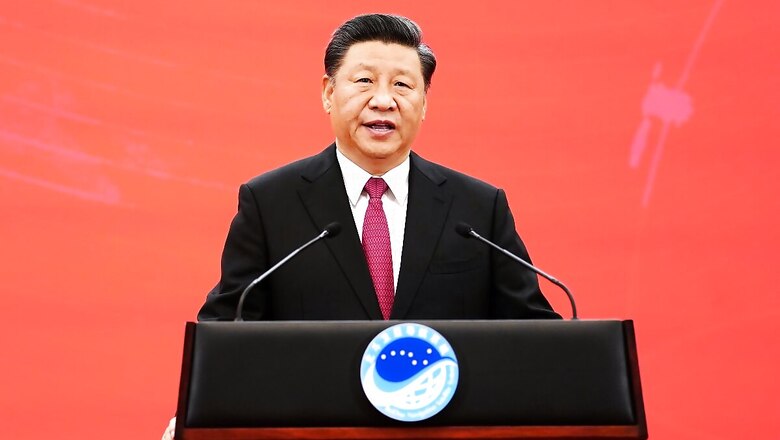
views
A Republican lawmaker, Scott Perry, has presented a bill in the United States House of Representatives, Name the Enemy Act, demanding the Chinese head of state, Xi Jinping, should not be referred to as the ‘Chinese President’ anymore. China is not a democracy and Chinese people have not elected him while the word ‘President’ is generally used for the head of a republic, he has argued.
China’s 1954 constitution, under Mao Zedong, the founder of the People’s Republic of China, called the Chinese leader ‘Chairman’ in its English translation. But to give the Chinese Communist Party (CPC) absolute power over the country, Mao introduced a new constitution. The new constitution in 1975 eliminated the ‘State Chairman’ office. The ‘Party Chairman’ of the Chinese Communist Party (CPC) was now the most powerful person in the country.
But when China decided to open its economy in 1979 to connect to the outside world, then the country’s head of the state, Deng Xiaoping, thought of some cosmetic changes to please the international community. A new constitution was enacted in 1982 which talked about judicial rights, freedom of press, freedom of speech and protection of human rights. Moreover, the new constitution also re-established the ‘State Chairman’ office, with its English translation of the state leader as the ‘President’ now. Deng Xiaoping also put a two-term limit to the future presidents’ office.
But the so-called ‘reformist’ constitution failed as it was silent on the absolute powers of the CPC. And the massacre at the Tiananmen Square protests made this apparent.
Now the current Chinese president, Xi Jinping, it seems, is all set to debunk all those claims falsely made some 40 years ago. He is working to establish a personality cult for himself like Mao Zedong and wants to remain China’s president as long as he wants. It seems he wants to control China as ‘Party Chairman’, like Mao did.
Xi Jinping has become so powerful that he has abolished the two-term rule and can remain China’s president even for life unless he is brought down by the internal rival factions in the Chinese Communist Party.
But the possibility of the internal rival factions emerging in the ruling CPC looks bleak when we see the brutal crackdown machinery Xi Jinping has established in China, in the name of bringing down corruption, to sideline his political rivals. And abolition of the two-term rule is the best example to understand it as his political rivals failed to stop him.
Xi was inducted in China’s most elite political body, Politburo Standing Committee, in 2007, made vice-president in 2008 and was seen as a likely successor to previous Chinese president Hu Jintao. He became General Secretary of the Chinese Communist Party in 2012 where he said his first motto was bringing China out of its massive corruption problem. It was a clear move to emerge as a hero in people’s perception.
According to Xinhua, China’s official news agency, 2012 saw 173,000 corrupt officials punished. With Xi becoming Chinese president the next year, the graph of corrupt Chinese officials being punished has mostly seen an uptick every year, something that may build his image among China’s ordinary people.
Year-wise number of corrupt officials punished:
2012: 173,000
2013: 1,82,000
2014: 232,000
2015: 3,36,000
2016: 4,15,000
2017:5,27,000
2018:6,21,000
2019 (Jan-Nov):485,000
(Xinhua and Central Commission for Discipline Inspection, China)
Though it was a good populist move, Xi used it to sideline his political rivals as well. Xi began his term with formation of small groups headed by his trusted people to rule over the ministries.
According to a BBC analysis, under Xi’s first term, from 2012 to 2017, more than 170 ministers and minister-level officers were sacked with many in jail facing charges of corruption and violation of party discipline. From 1949 to 2012, China saw 35 CPC Central Committee Members prosecuted in different cases, but under Xi’s leadership, just five years, from 2012 to 2017, saw conviction of the same number of Central Committee Members.
The past three years, from 2017 to 2019, saw China launching probes into 86 key officials of the CPC, government organs and certain financial institutions and 61 high-profile centrally administered officials. One of the political leaders convicted was former rising star Sun Zhengcai. A politburo member, he was tipped to be a future president. In 2017, Sun was accused of CPC disloyalty. The CPC claimed he was involved in a plot to overthrow Xi Jinping but when he was sentenced to life in May 2018, he was, in fact, convicted for bribery.
The latest high-profile victim in Xi’s purge is Cai Xia, a CCP insider. Staying in the US since 2019, she was a professor in the Central Party School of CCP where the Chinese president and top leaders spend their formative years. The CCP has expelled her from the party for discipline or, rather, for being disloyal to Xi Jinping. She says the CCP has become a political zombie under Xi Jinping’s leadership and Xi has alienated China from the world. She has also accused him of provoking conflict with India.
Key officials probed:
2017: 9
2018: 15
2019: 62
High-profile centrally administered officials probed:
2017: 18
2018: 23
2019: 20
(Xinhua and Central Commission for Discipline Inspection, China)
Xi Jinping has not left even the army. His first term saw investigation and sacking of more than 60 generals. They were replaced with young officers who will remain more loyal to Xi than aged army generals. Those purged included General Fang Fenghui, the former chief of joint staff and General Zhang Yang, the former Political Work Department director of the Central Military Commission (CMC).
In January this year, Xi Jinping vowed to deepen this anti-corruption system machinery put in place. A communique was adopted to give more teeth to the process. Xi put emphasis on reforming the disciplinary inspection and supervision system. So, we can expect more purge in the days ahead as Jinping completes his second term as the General Secretary in 2022 and as President in 2023.
Most high-profile leaders targeted so far:
Cai Xia: Was CPC insider, professor at CPC school for senior political leaders and an outspoken critic of Xi. Was expelled from CPC, her retirement benefits stripped. Presently staying in the US.
Ren Zhiqiang: Veteran CPC Member and property tycoon of China. Was also an outspoken critic of Xi. He was expelled from CPC, his assets seized. He is facing criminal charges.
Sun Zhengcai: Politburo member, was tipped to be the future PM. CPC claimed that he plotted to overthrow Xi Jinping. Was handed life sentence for bribery.
Zhou Yongkang: Third senior-most politician, was China’s security chief. CPC claimed he plotted to overthrow Xi Jinping and he was jailed for life for bribery, corruption and disloyalty.
Xu Caihou:: He was the Vice-Chairman, Central Military Commission. CPC claimed he, too, plotted to overthrow Xi Jinping. He was expelled from CPC, prosecuted. Caihou died from cancer in 2015.
Ling Jihua: A trusted advisor of Hu Jintao, Director of the General Office of CPC, he has been jailed for life for bribery. CPC claimed he plotted to overthrow Xi Jinping.
Guo Boxiong He was the Vice Chairman of the Central Military Commission. CPC claimed he plotted to overthrow Xi Jinping. He has been Jailed for life for bribery.



















Comments
0 comment